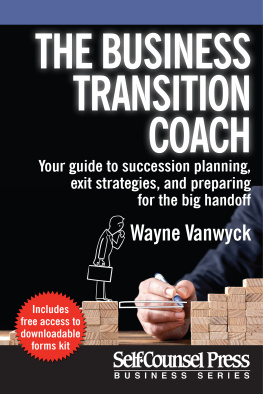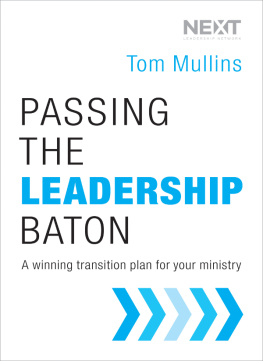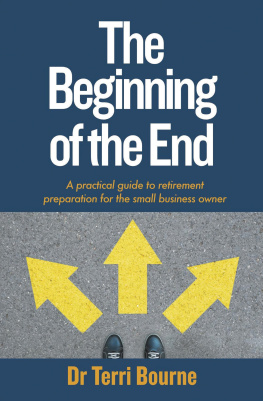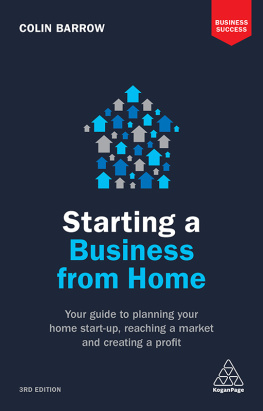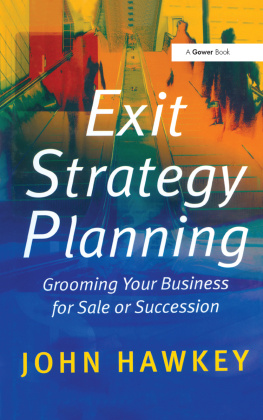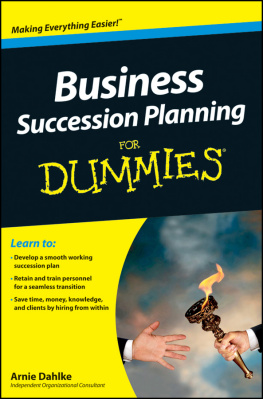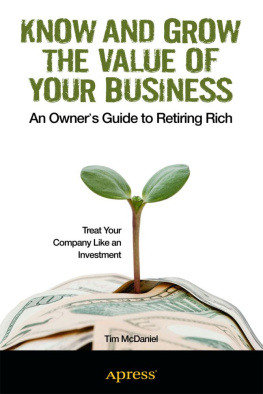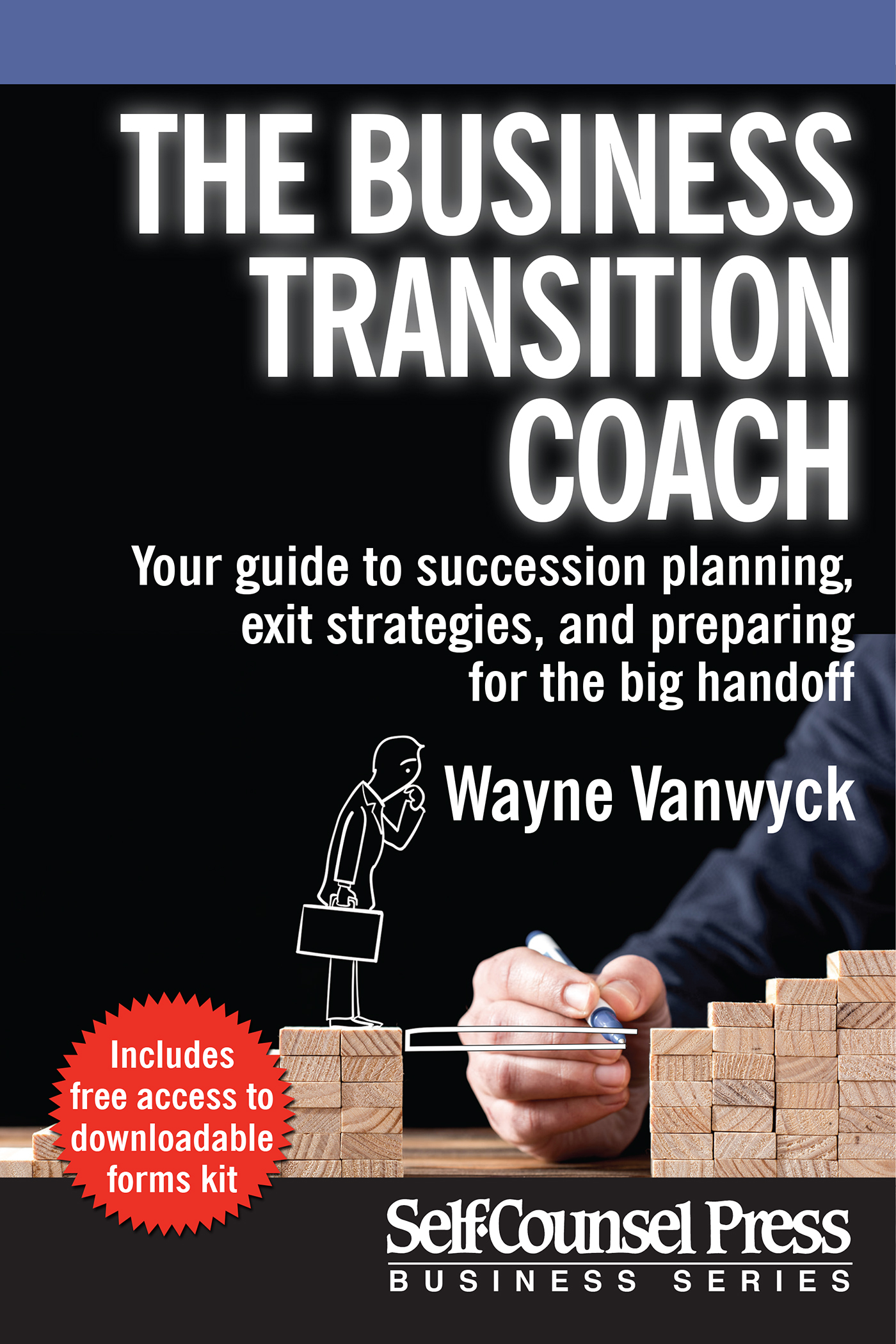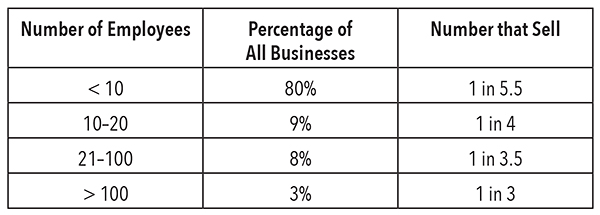Preface
If you are a business owner, chances are seven in ten that you are thinking about selling your business but have little or no idea how to do it.
Several years ago, a friends brother whom Ill call Franklin decided to sell his business. He had grown a very successful industrial supply distribution company. He was doing about $10 million in profitable sales, was a pillar of the business community, and was liked by his employees. To all appearances, he was a very successful business owner.
With some fanfare, Franklin announced to his family that he and his wife were going to sell the business and retire in five years. Many who knew his workaholic ways raised their eyebrows in disbelief. He didnt have any outside hobbies and thought about the business 24/7. He despised vacations and when his wife insisted, he would grudgingly go along (looking for business opportunities along the way). No one could see him walking away from his business without a struggle. Sure enough, although his wife retired right on time, the date for Franklins planned departure came and went.
Unfortunately, his plan wasnt really a plan. It was barely a good intention. Perhaps it was just a ruse to placate his spouse.
As his deadline approached, he threw a monkey wrench into the business, creating a huge challenge that only he could solve. He changed his major supplier after selling the same product line for more than 20 years. To this day, no one knows for sure why he did it, but the consequences were catastrophic. Clients left. Salespeople quit. His business went into a tailspin. Of course, Franklin nobly renounced his intention to retire. Now he could swoop in like Superman to save the day.
Unfortunately, the crisis he created was bigger than he anticipated and things continued to deteriorate. He was under far more stress than ever in his business career. Within a couple of years, he was in danger of losing everything.
His sister, a business consultant, offered to relocate several hundred miles to help him. She ended up running the company because he was so emotionally and physically stressed that he was institutionalized and put on medication to prevent him from committing suicide. He was literally banging his head against the wall.
In the end, he did sell his business for cents on the dollar but the experience was devastating. Franklins opportunity to retire with wealth and a stellar reputation turned into a nightmare that reduced him to a shadow of his former self. He lost the respect of his employees, his customers, and his family. He lost millions of dollars. He no longer speaks to his sister, with whom he had previously been very close.
If only someone had said to him when he announced his intention to retire in five years, Lets get started! Heres a step-by-step process that will ensure that youre ready in that time, he could have saved himself incalculable grief. But as I looked around, it became obvious to me that no such program or process existed. Sure, there were books that told you how to value your business or how to negotiate the best price. But there was nothing on how to get mentally, emotionally, and practically prepared for the day when you sell or step away from your business.
Maybe this is an extreme example, but in speaking with hundreds of business owners about this, one thing has become clear. Its a very difficult step to sell a business. Its an amazingly complex and foreign process. Its a lot of work. Business owners dont have a lot of time to do it. And their businesses are their babies things they have created, nurtured, grown, defended, and loved for many years. Giving them up threatens to leave enormous holes in their lives.
Thats the reason for this book. My humble goal is to alert you to the coming sell-off of businesses as aging entrepreneurs sell and retire in record numbers. If you start planning your transition before it becomes urgent or you have no choice, you can profit greatly. You will be better able to sell your business or put it into family or employee hands in a way that maximizes value for all concerned.
You dont have to be like Franklin, undoing a lifetime of solid, creative work by not being ready for the next stage in your life and the life of your business.
Ive struggled myself with this issue. As a serial entrepreneur, Ive found it fun and exciting to start businesses but difficult to give them up. Ive written this book for all of us who are struggling with the questions of what to do next, how to let go, and how to get the most value from our years of blood, sweat, and tears.
Introduction
This is urgent. I dont know about you, but I am bothered by some statistics. Ill be sharing numbers throughout this book, for example, as of this writing 70 percent of entrepreneurs intend to retire in the next few years but very few of those entrepreneurs have a written plan for succession (PWC, www.pwc.com/ca/en/private-company/once-in-a-lifetime.html, accessed March, 2020).
Thats a tsunami of change, a wave of literally millions of businesses owned by wannabe retirees who dont have a transition plan. This doesnt even include those who may die or become disabled in the same time frame. This is a massive liability for the economy and for business owners who dont know where to turn.
This is a source of deep insecurity for employees who may have a lifetime of service invested in these companies. Conversely, its a huge opportunity for those with the ability to purchase businesses.
Following in Table 1 is another interesting set of statistics, from the book Successfully Sell Your Business (Rogerson Business Services, 2011).
Table 1: US Businesses for Sale and How Many Actually Sell
This means that the majority of businesses have less than a 20 percent chance of selling when put on the market. These facts raise some disturbing questions in my mind:
What happens to a business, its employees, and its suppliers when the owner decides to sell but hasnt planned for it?
What happens to the owners when they are unable to sell their businesses for what they think theyre worth, or when they are unable to sell them at all?
What resources are out there to help owners maximize business value and prepare to sell in order to get the dollars they want in return for their years of toil and risk?
What will happen to the economy when millions of businesses come up for sale? Whos going to buy all those businesses?
If only a small percentage of businesses that go up for sale are actually sold, what happens to all the others? What happens to the owners, the clients, the employees, the suppliers?
If there are millions of businesses for sale, how does an individual owner make his or her business stand out and be attractive to prospective buyers so it is more likely to be one that is chosen?
Is there a step-by-step formula for success in selling a business that could help an entrepreneur avoid many of the pitfalls and losses while leveraging his or her company to increase its value?
Why do so few business owners have a plan and how can we help them to prepare so they sell their businesses on purpose instead of by default?

